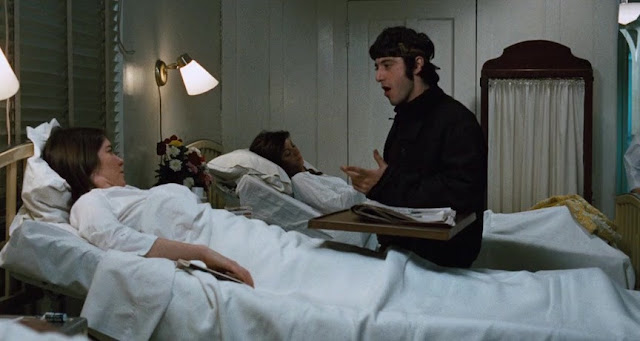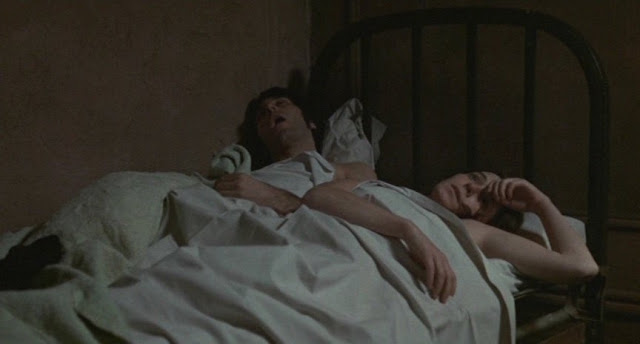
The drug film is a hard film to watch--at least if it's done the right way. For modern audiences, the most gut-wrenching experience to come along in quite a while is likely Darren Aronofsky's Requiem for a Dream, a film which saw drugs tearing apart four different people in different ways, rendering their shared relationships obsolete and their futures cut very short. The Panic in Needle Park traverses the same ground, only it did so thirty years prior. Above all, its story focuses on the doomed romance (aren't they all?) between Al Pacino's Bobby and Kitty Winn's Helen, who meet randomly at a drug deal of sorts and who begin, unexpectedly, a savage and passionate romance that will see Helen fall victim to the same drug habit that Bobby claims he doesn't have. As you can imagine, it doesn't end well.
Director Jeffrey Schatzberg, who battled in getting this film made, has no romantic notions about New York City, or more specifically, "Needle Park" (a nickname for Sherman Square) where drug users were known to congregate and trade tips about who is holding, and where, and who might have the bread to get off. Settings like these, or broken-down tenement buildings, or prison-like apartments, are where the bulk of the story take place. (Ironically, the only scenes that contain any brightness at all are during Helen's pre-drug addiction scenes spent in a flat or a hospital bed where she is both temporarily recovering and suffering side effects from a botched abortion, respectively.) But as Helen follows Bobby down his drug-addled rabbit hole, the lights around them dim. Their romance changes face from idealistic, to hopeful, to dreadful.

In Al Pacino's film debut in a lead role, his Bobby is a tough-talking street hood defying authority at every opportunity while smacking gum or chain smoking cigarettes (sometimes both) in an effort to keep his mind off the fact that he hasn't used in a while and, well, he really really wants to. But the real showstopper here is Kitty Winn as Helen, whose slow transformation from innocent/fully naive to hopeless addict of both heroin as well as her boyfriend (and on-again/off-again "fiancé"), is where the sucker punch really takes place.
There's a disarming documentary quality to The Panic in Needle Park, where people interact with awkward sincerity, and where there's no happy ending in sight. Schatzberg has no qualms about letting the camera get in close to see Bobby, or Helen, or an array of the dead-ends who surround them, stick that needle into their veins and slowly inject themselves. For minutes at a time, the viewer has no choice but to watch. There's nothing else on screen they can use to momentarily affix their gaze while they wait for the needle nastiness to disperse. Schatzberg shoves this image into your eye-line because it should be shoved there. He also doesn't want his audience to escape from the ugliness, so when there isn't explicit drug-use on screen, he instead relies on the film's environment to convey that ugliness. The Panic in Needle Park takes place in the scummiest rooms and alleys and rooftops of the scummiest areas in New York City. Every interior features peeling paint or wallpaper, painted in a sickening green or a flat gray. Outdoors, we're treated to graffitied walls and litter-strewn streets. There is no escape, no matter where we go, and no matter what characters are on screen.

Like Requiem for a Dream, The Panic in Needle Park is a film that effects rather than entertains, hewing closer to life than our happy-ending-wanting brains have come to expect, which is what makes it such a visceral experience. One could argue that the ending is a happy ending of sorts, if only for our characters and no one else. No matter the trials and tribulations they each experience, and no matter the depths they'll plunge, they always come back, and they always end up in each other's arms. Whatever battles they have to overcome, they'll find a way to do it, and they'll do it together. They are doomed, that's for sure, but doom is in the eye of the beholder.
The Panic in Needle Park is a tough film to watch, as any well-made film about drug abuse should be. And it's worth watching for two reasons, both similar and very disparate: the first would be to see Al Pacino in his film debut, who hits the ground running in an explosive performance and who is still celebrated today, but the second would be to see Kitty Winn, whose performance has been even more heralded, but who slowly disappeared from the world of acting after her turns in and The Exorcist (and its deplorable first sequel). As film's end, you won't be left feeling good, but being that was the intention, The Panic in Needle Park is a success.

